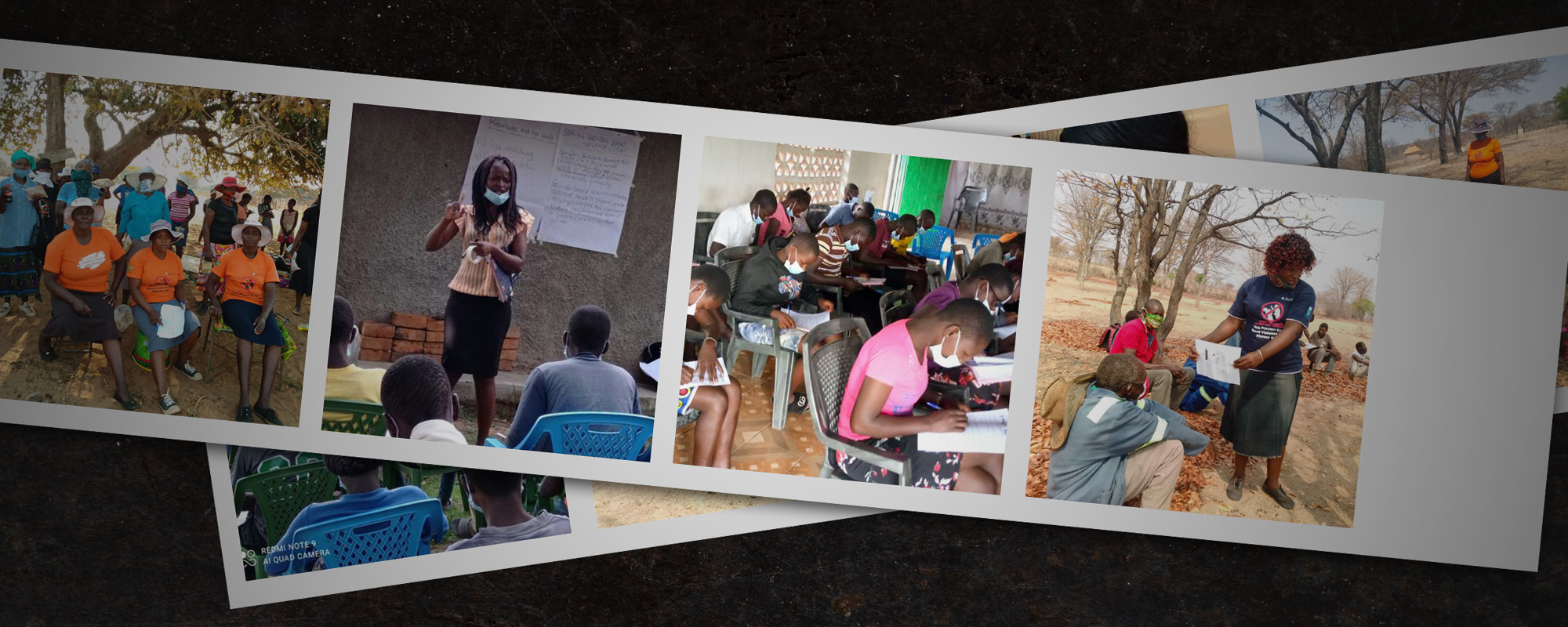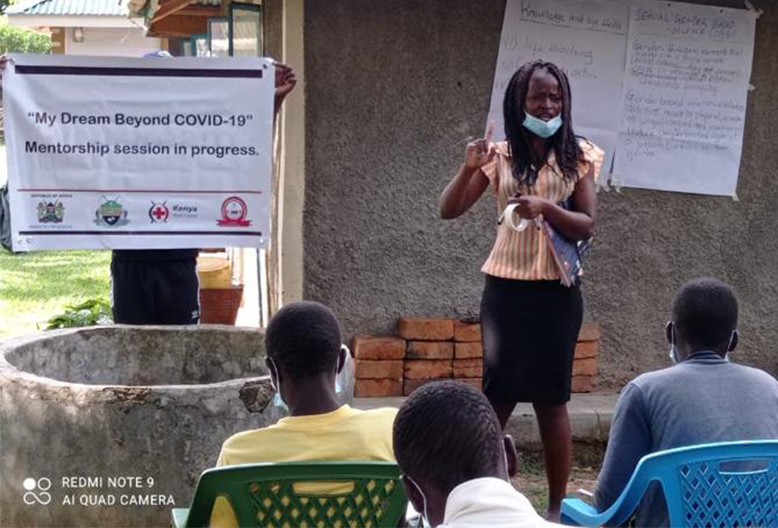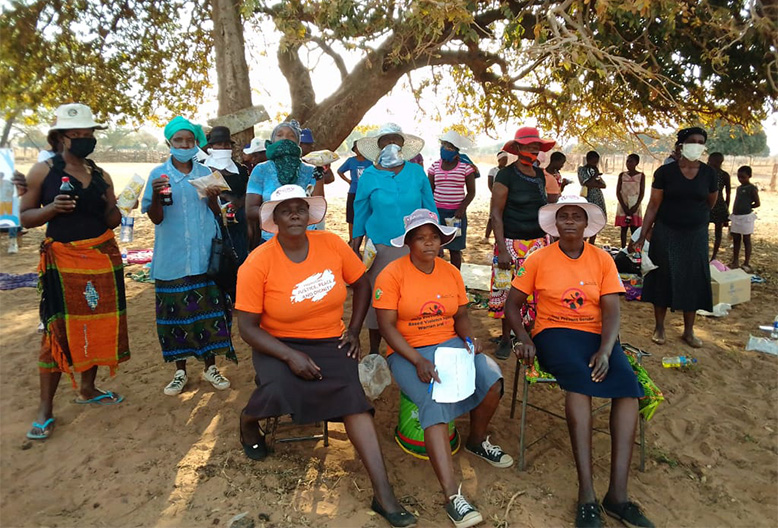

Fighting Violence Against Women and Girls During COVID-19
When COVID-19 arrived and countries went into lockdown, this not only posed a threat to people’s health, but also to their human rights. Occurrences of gender-based violence (GBV) – where a person is attacked based on their gender or gender identity – and intimate partner violence by a spouse or domestic partner increased. Lockdowns and stay-at-home policies closed safe shelters and prevention services, leaving some populations – particularly those most vulnerable to violence – at increased risk of abuse.
School closures meant that adolescent girls and young women became vulnerable to the knock-on impacts of poverty and food insecurity, pushing some to adopt risky behaviors such as intergenerational transactional sex – where some young women and girls have sex with older men in exchange for gifts, money or food. These behaviors are major drivers of HIV infections. School closures also coincided with an increase in teenage pregnancy, as lockdowns limited access to sexual and reproductive health and rights services. While girls and women, including transgender women, suffer disproportionately from gender-based violence, men and boys can also be targeted.
The Global Fund’s COVID-19 response is guided by a rights-based and gender-responsive approach. We work with countries to respond more effectively to COVID-19 and mitigate the potential negative consequences of the pandemic on existing Global Fund-supported programs. The Global Fund’s integrated approach takes into account community, rights and gender and includes focusing appropriate attention on the most marginalized. We tailor gender-responsive and human rights programming to best address the challenges of COVID-19, and we support the engagement of key and affected communities in decision-making processes. We put the most vulnerable and most-at risk at the center of the programs we support to ensure no one is left behind.
Countries included interventions and activities responding to gender-based violence in funding requests to the Global Fund’s COVID-19 Response Mechanism (C19RM). Here are some of the ways in which these investments are having an impact and complement existing country efforts.
Kenya

A facilitator trains her peers to become facilitators themselves, and to respond to and prevent GBV in their communities.
Photo: Kenya Red Cross
In Kenya, GBV was already an issue before COVID-19. The Global Fund works with partners including the National AIDS Control Council (NACC), the Kenya Red Cross, the Ministry of Health as well as the Ministry of Public Service, Youth and Gender Affairs, to run programs supporting adolescent girls and young women. The GBV programs have a huge community component. Young people are at the center of the response, acting as champions of GBV prevention and informing their communities and peers of their rights. The program facilitated by the Kenya Red Cross Society empowers survivors of GBV to also get justice: When people know what their rights are, they are more likely to achieve justice.
However, the pandemic contributed to an increase in GBV and domestic abuse. September 2020 saw the highest number of reported sexual violence cases in three years, and a rapid assessment by the Kenya Red Cross found that a significant proportion of GBV survivors were adolescents and minors. In the early stages of the pandemic during stay-at-home directives, adolescent girls and young women had limited access to traditional safe spaces, such as schools, and were at further risk of teenage pregnancies. The stay-at-home directives also affected other vulnerable populations, disrupting HIV prevention services and access to essential commodities like antiretroviral therapy, condoms, pre-exposure prophylaxis, post-exposure prophylaxis, and lubricants.
Through targeted C19RM investments, the Global Fund and in-country partners including the Kenya Red Cross support survivors of sexual and gender-based violence, focusing on violence prevention activities and strengthening access to medical and psychosocial care for survivors. These investments also support survivors to get justice through para-legal assistance and criminal proceedings against abusers. Human rights are a key concern in the Global Fund’s COVID-19 response. C19RM funding in Kenya supports the monitoring of human rights abuses related to COVID-19, and the scale-up of emergency services like safe houses in instances of human rights abuse. The program also fosters ongoing dialogue between law enforcement officers and communities on responsive policing, including responding to GBV and domestic abuse.
“The young mentors and facilitators of the program have become peer leaders who have achieved a high level of self-awareness in their role as champions for ending sexual and gender-based violence among children, adolescents and young women within their community and counties,” said Emily Muga from the Kenya Red Cross. “Their commitment to ending sexual and gender-based violence is inspiring their peers to take action for themselves and others.”
Zimbabwe

Community champions who work with the One Stop Centers inform their community about GBV prevention.
Photo: National AIDS Council, Zimbabwe
In Zimbabwe, the Global Fund is fighting GBV together with partners including community champions, UNDP, UN Women, the National AIDS Council (NAC) of Zimbabwe, and the Ministry of Women Affairs, Community, Small and Medium Enterprises Development responsible for coordinating the national GBV response. The program has established GBV programs in specific districts of the country, which are selected based on high HIV burden and broader programs for adolescent girls and young women.
GBV programs include community responses that focus on GBV prevention, where activists raise public awareness about the issue. Some of these activists are trained according to the SASA! model, which is a community mobilization approach to prevent violence against women and HIV that was developed in Uganda.
In addition, activists join HIV prevention programs in schools and deliver GBV prevention messages. Another important component of the GBV programs is the One Stop Centers, which are attached to health facilities and focus on responding to GBV and supporting survivors. Run by the Zimbabwe Association of Church-Related Hospitals (ZACH), a faith-based organization partnering with the Global Fund, these centers bring multisectoral services for GBV under one roof, including health services provided by dedicated nurses, legal services to connect survivors with the justice system, and socioeconomic support. The people using these One Stop Centers range from adolescents to older women.
However, COVID-19 has forced these services to adapt to the pandemic situation, particularly as Zimbabwe has experienced significant restrictions and long lockdowns.
Zimbabwe’s Ministry of Health began to use mobile clinics to reach more people. The One Stop Centers partnered with them, joining the mobile vans that go out to the communities. Activists came too, so that they could advocate against GBV in communities, while the One Stop Centers offered their services through the mobile clinics. This approach proved to be extremely successful. The mobile centers received more people than they did in the static centers, as more women who were experiencing domestic violence became aware that support was available. Bolstered by this success and supported by the Global Fund’s C19RM investments, Zimbabwe is expanding this model of mobile clinics. This strategy will continue beyond the pandemic, to ensure survivors of GBV in the remotest areas have access to these lifesaving services.
“The One Stop Centre approach has improved the reporting of GBV cases from the communities,” explained Chidzewere Nzou from the Zimbabwe Association of Church-Related Hospitals. “Communities have gained confidence in the post-violence care given to survivors. The provision of legal aid has helped vulnerable women gain protection from perpetrators, and this has helped more women to come forward. Referrals through the One Stop Centers have also increased the uptake of HIV testing and counselling services.”
Conclusion
The gendered dimensions of pandemics are often overlooked, leading to worse outcomes for the most vulnerable. As emphasized in its new Strategy for 2023-2028, the Global Fund is committed to working with countries in an integrated way to address inequities, human rights and gender-related barriers, and scale up and strengthen interventions targeting gender-based violence prevention and response. Through a concerted, coordinated and intensified effort across the partnership, the Global Fund will continue to work with partners to drive lasting change to better reach those most vulnerable to infection, safeguard the rights of affected communities and individuals, and realize more equitable health outcomes for all.







